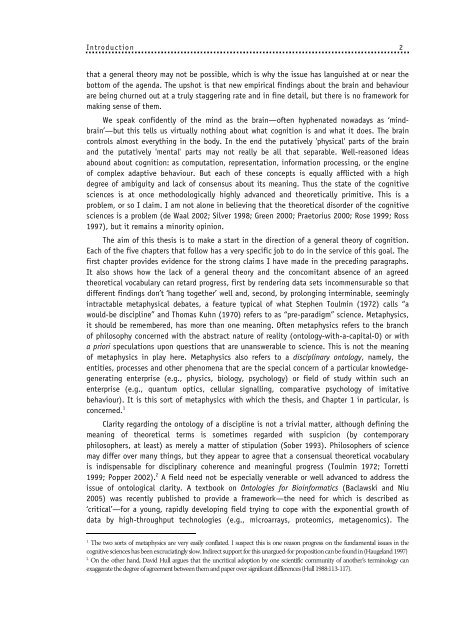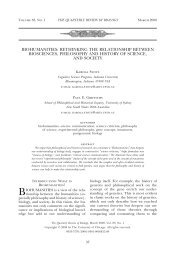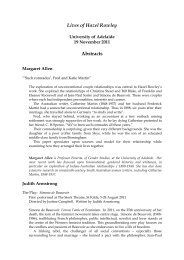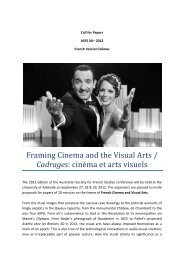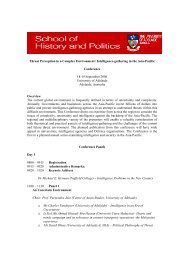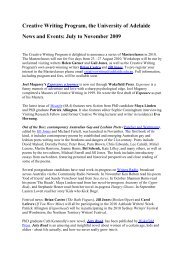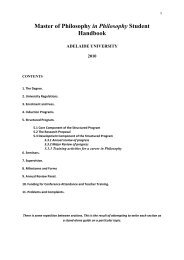Introduction - Faculty of Humanities & Social Sciences
Introduction - Faculty of Humanities & Social Sciences
Introduction - Faculty of Humanities & Social Sciences
You also want an ePaper? Increase the reach of your titles
YUMPU automatically turns print PDFs into web optimized ePapers that Google loves.
Introdu ctio n 2<br />
that a general theory may not be possible, which is why the issue has languished at or near the<br />
bottom <strong>of</strong> the agenda. The upshot is that new empirical findings about the brain and behaviour<br />
are being churned out at a truly staggering rate and in fine detail, but there is no framework for<br />
making sense <strong>of</strong> them.<br />
We speak confidently <strong>of</strong> the mind as the brain—<strong>of</strong>ten hyphenated nowadays as ‘mindbrain’—but<br />
this tells us virtually nothing about what cognition is and what it does. The brain<br />
controls almost everything in the body. In the end the putatively 'physical' parts <strong>of</strong> the brain<br />
and the putatively 'mental' parts may not really be all that separable. Well-reasoned ideas<br />
abound about cognition: as computation, representation, information processing, or the engine<br />
<strong>of</strong> complex adaptive behaviour. But each <strong>of</strong> these concepts is equally afflicted with a high<br />
degree <strong>of</strong> ambiguity and lack <strong>of</strong> consensus about its meaning. Thus the state <strong>of</strong> the cognitive<br />
sciences is at once methodologically highly advanced and theoretically primitive. This is a<br />
problem, or so I claim. I am not alone in believing that the theoretical disorder <strong>of</strong> the cognitive<br />
sciences is a problem (de Waal 2002; Silver 1998; Green 2000; Praetorius 2000; Rose 1999; Ross<br />
1997), but it remains a minority opinion.<br />
The aim <strong>of</strong> this thesis is to make a start in the direction <strong>of</strong> a general theory <strong>of</strong> cognition.<br />
Each <strong>of</strong> the five chapters that follow has a very specific job to do in the service <strong>of</strong> this goal. The<br />
first chapter provides evidence for the strong claims I have made in the preceding paragraphs.<br />
It also shows how the lack <strong>of</strong> a general theory and the concomitant absence <strong>of</strong> an agreed<br />
theoretical vocabulary can retard progress, first by rendering data sets incommensurable so that<br />
different findings don’t ‘hang together’ well and, second, by prolonging interminable, seemingly<br />
intractable metaphysical debates, a feature typical <strong>of</strong> what Stephen Toulmin (1972) calls “a<br />
would-be discipline” and Thomas Kuhn (1970) refers to as “pre-paradigm” science. Metaphysics,<br />
it should be remembered, has more than one meaning. Often metaphysics refers to the branch<br />
<strong>of</strong> philosophy concerned with the abstract nature <strong>of</strong> reality (ontology-with-a-capital-O) or with<br />
a priori speculations upon questions that are unanswerable to science. This is not the meaning<br />
<strong>of</strong> metaphysics in play here. Metaphysics also refers to a disciplinary ontology, namely, the<br />
entities, processes and other phenomena that are the special concern <strong>of</strong> a particular knowledgegenerating<br />
enterprise (e.g., physics, biology, psychology) or field <strong>of</strong> study within such an<br />
enterprise (e.g., quantum optics, cellular signalling, comparative psychology <strong>of</strong> imitative<br />
behaviour). It is this sort <strong>of</strong> metaphysics with which the thesis, and Chapter 1 in particular, is<br />
concerned. 1<br />
Clarity regarding the ontology <strong>of</strong> a discipline is not a trivial matter, although defining the<br />
meaning <strong>of</strong> theoretical terms is sometimes regarded with suspicion (by contemporary<br />
philosophers, at least) as merely a matter <strong>of</strong> stipulation (Sober 1993). Philosophers <strong>of</strong> science<br />
may differ over many things, but they appear to agree that a consensual theoretical vocabulary<br />
is indispensable for disciplinary coherence and meaningful progress (Toulmin 1972; Torretti<br />
1999; Popper 2002). 2 A field need not be especially venerable or well advanced to address the<br />
issue <strong>of</strong> ontological clarity. A textbook on Ontologies for Bioinformatics (Baclawski and Niu<br />
2005) was recently published to provide a framework—the need for which is described as<br />
‘critical’—for a young, rapidly developing field trying to cope with the exponential growth <strong>of</strong><br />
data by high-throughput technologies (e.g., microarrays, proteomics, metagenomics). The<br />
1<br />
The two sorts <strong>of</strong> metaphysics are very easily conflated. I suspect this is one reason progress on the fundamental issues in the<br />
cognitive sciences has been excruciatingly slow. Indirect support for this unargued-for proposition can be found in (Haugeland 1997)<br />
2<br />
On the other hand, David Hull argues that the uncritical adoption by one scientific community <strong>of</strong> another’s terminology can<br />
exaggerate the degree <strong>of</strong> agreement between them and paper over significant differences (Hull 1988:113-117).


